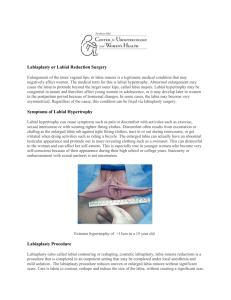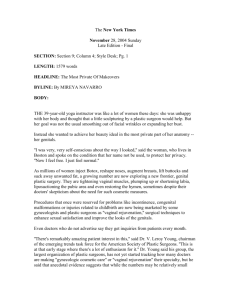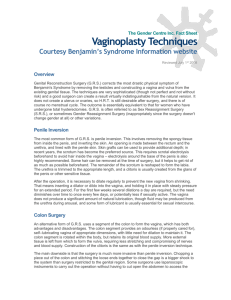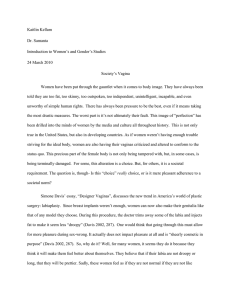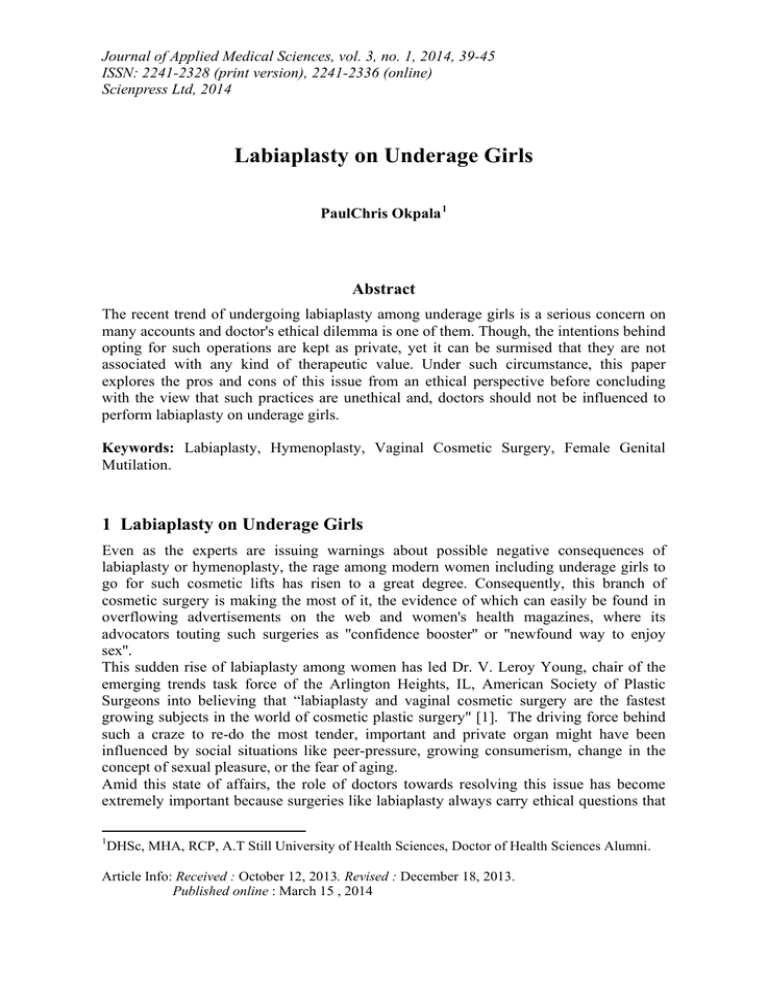
Journal of Applied Medical Sciences, vol. 3, no. 1, 2014, 39-45
ISSN: 2241-2328 (print version), 2241-2336 (online)
Scienpress Ltd, 2014
Labiaplasty on Underage Girls
PaulChris Okpala 1
Abstract
The recent trend of undergoing labiaplasty among underage girls is a serious concern on
many accounts and doctor's ethical dilemma is one of them. Though, the intentions behind
opting for such operations are kept as private, yet it can be surmised that they are not
associated with any kind of therapeutic value. Under such circumstance, this paper
explores the pros and cons of this issue from an ethical perspective before concluding
with the view that such practices are unethical and, doctors should not be influenced to
perform labiaplasty on underage girls.
Keywords: Labiaplasty, Hymenoplasty, Vaginal Cosmetic Surgery, Female Genital
Mutilation.
1 Labiaplasty on Underage Girls
Even as the experts are issuing warnings about possible negative consequences of
labiaplasty or hymenoplasty, the rage among modern women including underage girls to
go for such cosmetic lifts has risen to a great degree. Consequently, this branch of
cosmetic surgery is making the most of it, the evidence of which can easily be found in
overflowing advertisements on the web and women's health magazines, where its
advocators touting such surgeries as ''confidence booster'' or ''newfound way to enjoy
sex''.
This sudden rise of labiaplasty among women has led Dr. V. Leroy Young, chair of the
emerging trends task force of the Arlington Heights, IL, American Society of Plastic
Surgeons into believing that “labiaplasty and vaginal cosmetic surgery are the fastest
growing subjects in the world of cosmetic plastic surgery" [1]. The driving force behind
such a craze to re-do the most tender, important and private organ might have been
influenced by social situations like peer-pressure, growing consumerism, change in the
concept of sexual pleasure, or the fear of aging.
Amid this state of affairs, the role of doctors towards resolving this issue has become
extremely important because surgeries like labiaplasty always carry ethical questions that
1
DHSc, MHA, RCP, A.T Still University of Health Sciences, Doctor of Health Sciences Alumni.
Article Info: Received : October 12, 2013. Revised : December 18, 2013.
Published online : March 15 , 2014
40
PaulChris Okpala
stem out of the sanctity of the healthcare profession especially when it involves any
underage girl, seemingly unaware of its possible negative consequences. Alongside,
doctors don’t have any established guideline to weigh the merit of the case, nor they have
any proven instance to evaluate the touted logic behind labiaplasty. The proximity
between the process of labiaplasty and Female Genital Mutilation (FGM), a practice that
has already been banned, commands a clear justification for labiaplasty. All these factors
together create a platform of confusion for the doctors from the ethical perspective and
therefore, this paper explores the issue of labiaplasty done on underage girls to find the
degree of ethical dilemma among doctors, before reaching its conclusion that it is only the
ethical voice of the doctors could save the society from heading towards disaster.
2 Literature Review
2.1 What is Labiaplasty
Labiaplasty surgically reshapes the overgrown or deformed labia minora. It is mostly
done to maintain a balanced shape in the vagina that conforms to the imagined concept of
its beauty. Labiaplasty is done by gynecologists or specialists in cosmetic surgery [2]. A
practice mostly confined in private hospitals, which have already settled down as a
separate industry due to its high return. The flurry of provocative advertisements on the
web or persuasive articles in the women’s health magazines corroborate this fact, where
the gullible ones are lured with the promise of reshaping their genitalia according to the
perceived standard of its beauty, though it is not known who sets the standard [3]. The
advocators of this ''beautification program'' don’t leave any stone to convince the
prospective customers about ''heightened sexual experience and increased self-esteem''
that can be obtained through such surgeries, which in turn would fill the life with joy and
happiness.
Since such outcomes, however desirable they be, cannot by cited as reasons for opting
labiaplasty or hymenoplasty, other reasons like a hindrance in sexual activity or a
deterrent to self-esteem are being shown by the women who are undergoing this process
[3]. These vague explanations turn into ironical accounts when a minor girl decides to
reshape her labia minora under the pretext of raising self-confidence or for preventing
hindrances in her sexual life in the future. In one instance, a child aspirant of labiaplasty
provided an explanation like "I told my mom and she said it wasn’t normal"! [4]. Some
adventurous women even go for Hymenoplasty (creation of a new hymen) or
vaginoplasty (tightening the inner muscles of the vagina) along with labiaplasty, thereby
dishing out money between $2,500 to 1,755,702 [6]. Though, this fad about labiaplasty is
relatively new, its practice is not at all new. It has always maintained a steady clientele
among the sex workers or the models who undergo this surgery for professional reasons,
whereas, there are instances of some sportspersons opting for this, too. Since these cases
are directly related to their respective professions, these are kept out of the discussion.
2.2 The Cause behind Effect
Women that opt for labiaplasty carry different kinds of background and attitude ranging
from insecurity to curiosity, let alone imagined necessity or helplessness. Those crises or
the premonitions are nonetheless important in women’s life. Thus, under the influence of
Labiaplasty on Underage Girls
41
catchy advertisements, a large number of women opt for labiaplasty, a trend that off late
netting minor girls who don’t even know what it is and what harm it can do to them. The
saddest part of the issue is that the mothers of such girls are taking the initiative to see
their offspring ''securing high self-esteem'' through labiaplasty!
In any case, there is no denying to the fact that fast-paced lifestyle has started telling on
the modern-day women’s lives in many ways. Subsequently, some kind of newer
demands have arrived in their world, which have created a good many newer business
propositions, particularly in the health sector, where an important subject like sex has also
been put under scanner. New avenues of sexual pleasure are being hounded out each day;
and, women are being subjected to complement those newfound adventures with their
body more than their counterpart.
It is not that this tendency is something new, but the intensity of current lifestyle has put
them under pressure to reshape not only their faces or body parts, but also their genitals,
all to stay afloat, to feel the pride as someone looked upon as ''wanted'', or just to feel
young from within. Our society has gradually evolved to accept the concepts like free sex,
and, the insecurity factor in the relationship has set in, yet that cannot be the reason
enough to allow labiaplasty for underage girls. That brings in the question regarding the
ethical voice of the doctors, which could be the only solution in preventing this dangerous
trend among underage girls.
3 Discussion
3.1 Doctor’s Explanations are Missing
Since there is no legal obligation to perform such operations on minors, could this be the
reason to gag the ethical voice of the doctors? Had it been otherwise, would there have
been more firsthand account of ''how it feels to do labiaplasty or hymenoplasty on a
minor'' from the doctors? The absence of any specific professional guideline covering
ethical or moral ground in this issue blurs the line between willing or unwilling doctors.
In other words, an unwilling doctor can never raise his or her voice against doing such a
surgery on minors. There is no clear instruction(s) from the authorities pertaining to any
circumstances such operations could be done and should not be done. There can be solid
clinical reasons in some cases such as "congenital anomaly", where such surgeries can be
considered as a necessary treatment.
3.2 Pitfalls for the Doctors
While the proponents of FGM can cite their reasoning as preservation of health and social
system with the help of social custom, advocators of labiaplasty don’t have much to offer
in defense to someone that claims that having no clear therapeutic reason, labiaplasty can
be considered as another version of female genital mutilation. For instance, breast
implantation has a legal corridor where it can be seen as a therapeutic solution against
"congenital absence of breast tissue" or "significant breast asymmetry"[7]. The absence of
such a legal corridor in case of labiaplasty creates another legal corridor for doctors; and,
that is ethical confusion. It is a fact that a minor initiated into labiaplasty can wrongly
perceive it as a therapeutic medical intervention - which might have serious implication
on her future life.
42
PaulChris Okpala
3.3 Limitations towards forming a Guidebook
There is no standard description regarding ''normal'' or ''abnormal'' labia that can convince
the medical fraternity, nor any tangible proof that such surgeries truly enhance one’s selfesteem or sexual pleasure. While there are instances of labia minora growing
asymmetrically after the puberty [8], there are instances that even after surgical
intervention, the asymmetry again formed due to further development. This serves as
another pointer towards ethical dilemma in doctors who are forced to do the surgery on
minors in spite of knowing fully well about such possibilities. Since the growth of labia
minora can have its link with ethnic issues, it is impossible to create a comprehensive and
applicable chart of evidence and to use its mean value. Therefore, the absence of
pathology fails labiaplasty to qualify as a clear subject for therapy.
3.4 Does Labiaplasty Truly Provide Psychological Benefits?
There is no evidence of such benefits found through standard scientific research [3] nor
there is any convincing proof that can defend the claim of reducing psychological
pressure in a minor through labiaplasty [9]. This is another area of doctors'' dilemma
where they cannot wholeheartedly claim about the efficacy of labiaplasty. In addition, the
knowledge of its possible harmful effect on women only weakens its ethical foundation.
3.5 Risk Factors
There are several risks associated with labiaplasty. They are as follow:
• The outcome (new shape of genitals) may not match with expectation. As it has been
mentioned earlier, labia minora can keep on growing even after attaining adulthood.
Thus, this trait can bring the labia minora back even after labiaplasty.
• Short and long-term pain in the vagina: short-term pains are associated with the shock
of surgery, which takes a short span of time to heal, but the long-term pain can have
deeper and complex causes which might need medical care to heal.
• Bruising, bleeding and infection: any of them can lead to complication if not treated
carefully.
• Irreversible situation of sexual dissatisfaction [2]. This possibility serves as paradox to
the concept of labiaplasty itself, which claims ''heightened sexual experience'' as one
of its main benefits.
The above lists explain why ethical dilemma can besot the doctors when it comes to doing
a labiaplasty procedure on a minor having a long life ahead of her.
4 Comparison with FGM Too is a Concern for the Doctors
While the greater section of the world want to prevent Female Genital Mutilation, a
practice now mostly confined in and around Saharan Africa, this spurt of labiaplasty for
the sake of beautification can draw a huge protest across the globe, thereby, denigrating
the doctors’ community as well. There are grounds for comparison. FGM is defined as
"all procedures involving partial or total removal of the external genitalia or other injury
to the female genital organs whether for ritual, cultural or other non-therapeutic reasons"
[10]. Now it is a fact that labiaplasty involves partial removal of the external part of
Labiaplasty on Underage Girls
43
genitalia, non-therapeutic reasons and cultural influence. From this perspective, anyone
can book labiaplasty under FGM Act 2003 in Britain [11].
4.1 Yardstick of Ethics for Doctors
The popular package of medical ethics developed in the United States is known as four
principles of ethics, based on four cornerstones like respect of autonomy, beneficence,
non-malfeasance, and justice that "offers a common, basic moral analytical framework
and a common basic moral language" [12]. These are the prima facie moral principles
that added another term like ''scope'' to extend its philosophy to a state where "irrespective
of the medical professional philosophy, politics, religion, moral theory, or life stance, he
or she will find no difficulty in committing to four prima facie moral principles plus a
reflective
concern
about
their
scope
of
application"[12].
Now, the gravity of ethical dilemma becomes apparent when one finds that it violates all
the four principles as follow:
1. Autonomy: respect for autonomy, which speaks about deliberated self-rule, where the
doctors can "make their own decisions on the basis of deliberation" [12], fails to
maintain its place when a doctor under any circumstance does labiaplasty on a minor
in spite of knowing that it can fail to fulfill the expectation of the client. The respect
of autonomy requires not deceiving the client, but in the case of labiaplasty done on
minors, it is seemingly violated, as minors are supposed to be totally unaware of the
far-reaching consequences of labiaplasty.
2. When it comes to Beneficence and non-malfeasance, doctors know that the
proclaimed benefits from labiaplasty like enhanced self-esteem or heightened sexual
pleasure are unsubstantiated, and its negative side effects can harm the patients, which
is a situation that contradicts even the traditional Hippocratic obligation, where the
doctors fail to provide the benefits they "profess" to be able to provide, as they operate
without the support of any proven instance of such proclaimed benefits.
3. The issue of justice joins in when labiaplasty is seen under the light of FGM, where
FGM has already been declared as unethical and labiaplasty bears resemblance with
its technical process as the external part of the genitalia is removed without any valid
justification. A serious surgery done to meet the ''Order of God'' (in the case of FGM)
or to achieve self-esteem'' cannot be valid reasons to defend such acts. Therefore,
labiaplasty fails to meet the requisites of ''rights based justice'', which is the respect for
people’s rights and morally acceptable laws.
5 Conclusion
The primary precondition of opting for labiaplasty or hymenoplasty is understandable that
such cosmetic lifts are for those only who can afford them. There are exceptions in cases
where professionals go for it for gaining competitive advantage, but the causes cited in
general, such as, enhancing self-esteem or boosting sexual life by most women remain
unsatisfactory because most of them are based on imagination. Such surgeries done on
minors, therefore, qualify to be labeled as a crime because such procedure involves
several risks of losing vitality and other practical problems like losing one’s healthy
sexual experience forever. The undercover desire to engage in more sexual adventure or
44
PaulChris Okpala
to fox the partner by suppressing one’s earlier sexual experiences commands a review
from an ethical perspective.
Though, the general feelings about doctors approach towards cosmetic surgery hints at
their notion of making money out of a demand that evolved out from the social situation,
yet, it would be unfair to include all doctors in that bracket because there are roadblocks
for them to come out clean on this issue since there is no clear norm of conducting such
surgery or refusing it. Thus, the primary ethical dilemma lies in the absence of a
comprehensive guideline for which the doctors cannot be blamed. However, the lack of
evidence regarding the efficacy of labiaplasty towards boosting self-esteem or preventing
its degeneration keeps it out of the periphery of therapy, and, loses relevance with the
motto of medical service. This is definitely a point of concern for the doctors.
The discussions show that labiaplasty in general can cause two types of dilemmas in
doctors. First, where the job at hand causes ethical bites from within even when there is
no legal or technical barrier in performing the job. Second, when the doctor is compelled
to perform the task against his or her ethical will or sanction. Yet, this is the sphere where
the doctors can come out of their shell and raise their ethical voice towards establishing
clear norms of labiaplasty or hymenoplasty rather than merely pointing out to the catch-22
situation. It is only the ethical voice of the doctors that could save the society from
heading towards disaster.
References
[1]
Kobrin, S.(2004). More Women Seek Vaginal Plastic Surgery. Women's eNews Inc.
Retrieved on April 23 2013, from:
http://www.womensenews.org/article.cfm/dyn/aid/2067/context/archive
[2] Conroy R M Female Genital Mutilation: whose problem, whose solution? British
medical journal 2006. 333:106 – 107
[3] Liao, L. M, & Creighton, S. M. (2007). "Requests for cosmetic genitoplasty: how
should health care providers respond?" British medical journal 2007: 334:190-2.
[4] Bramwell R., Morland, C., & Garden, A. (2007). Expectations and experience of
labial reduction: a qualitative study. British Journal of Obstetrics and Gynecology.
114(12):1493-9.
[5] Lloyd, J., Crouch, N. S., Minto, C. L., Liao, L.-M. and Creighton, S. M. (2005),
Female genital appearance: normality’ unfolds. BJOG: An International Journal of
Obstetrics & Gynaecology, 112: 643–646. doi: 10.1111/j.1471-0528.2004.00517.x
[6] Cosmetic Surgery. (2004). Vaginal Surgery Procedures. Retrieved on April 22
2013, from http://cosmeticsurgery2.com/cs1-female.htm
[7] Aesthetic Breast Surgery. (2006). Worcestershire PCT. Commissioning Policy:
2006, October, Version 1.1
[8] W. A. Marshall, J. M. Tanner: Arch Dis Child 1969;44:235 291-303
doi:10.1136/adc.44.235.291
[9] Alter, G. J. (1998). A new technique for aesthetic labia minora reduction. Annals of
Plastic Surgery. 40(3):287-290, March 1998.
[10] Buck, P. (2003). Female Genital Mutilation: Statement No. 3. London: RCOG, May
2003.
Labiaplasty on Underage Girls
45
[11] Female Genital Mutilation Act 2003. London: HMSO, 2003. Gillon, R. (2004).
Medical ethics: four principles plus attention to scope. British medical journal 1994;
309:184 (16 July).


